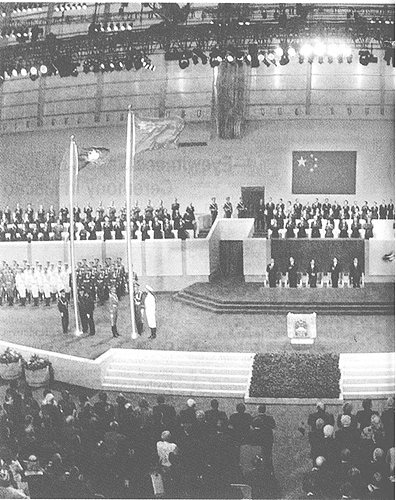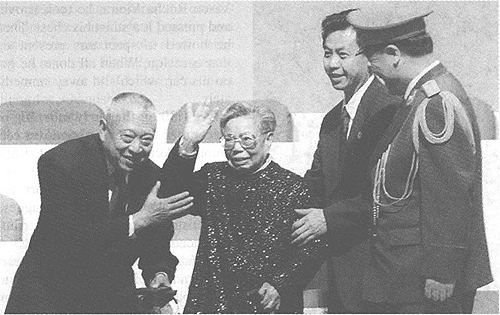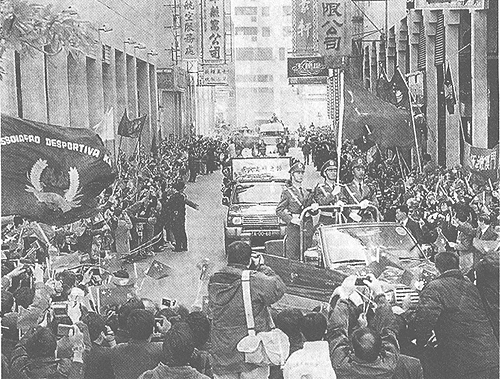| Eyewitness Report on the Handover Ceremony in Macao
'Do you know that 'Ma Kwok' is not my real name?
I've left your swaddling clothes for too long, Mother!
But what they have taken away is my flesh and you still have my soul.
Mother whom I have never forgotten day and night!
Please call me by my infant name, call me 'Ao Men'!
Mother! I want to come back, Mother!"
This is a part of the Song of Seven Sons, written by Wen Yiduo (Wen I-to), a famous Chinese scholar, in the 1930s. It tells how Macao yearned for a return.
On December 20, 1999, the Chinese Government resumed exercise of sovereignty over Macao. Finally, the former Portuguese colony returned to the embrace of the motherland.
History Is Made at Midnight
The world turned its eyes on the handover ceremony to be held at the midnight of December 19 in the Handover Ceremony Pavilion, the semi-transparent, 20-meter-high architecture with a construction area of 6,600 square meters. Its rectangular hall has 2,500 seats spreading out like an arch facing the rostrum. Rinsed in drizzles, which had been going on for days and stopped only on December 19, the Handover Ceremony Pavilion looked completely clean, under complex lighting. I entered the Handover Ceremony Pavilion, which has the shape of a lotus flower, the symbol of the tiny city, 3.5 hours earlier as was required.
At 23:42, President Jiang Zemin, Premier Zhu Rongji, Vice-Premier Qian Qichen, Foreign Minister Tang Jiaxuan and Macao Special Administrative Region (MSAR) Chief Executive Edmund Ho Hau Wah entered the ceremony site and took their seats at the rostrum.
The same time saw Portuguese President Jorge Sampaio, Prime Minister Antonio Guterres, Foreign Minister Jaime Gama, outgoing Macao Governor Vasco Rocha Vieira and other Portuguese officials take their respective seats.
Chinese and Portuguese guards of honor conducted a salutation ceremony, followed by musical performances from bands of the two countries.
Portuguese President Sampaio was the first to speak at the ceremony. He said cooperation between the two sides enabled the necessary changes to occur, ensured the continuation of certain current practice and brought the centuries-old relationship into a new era. Finishing his speech, he went over to Chinese President Jiang for a handshake.
The Portuguese flag and the flag of Leal Senado, the Urban Council of Macao, were lowered at 23:58 as the national anthem of Portugal was played.
At this point of time, the whole hall waited for the historic moment in silence. At zero hour sharp, the Chinese flag and the MSAR flag were raised in 46 seconds as the national anthem of the People's Republic of China was played.
The Chinese and Portuguese governments thus completed their smooth transfer of power over Macao. People present on the occasion burst into thunderous applause.
At 0:4 on the morning of December 20, Chinese President Jiang delivered a speech, which was frequently interrupted by waves of enthusiastic applause. President Jiang shook hands with Portuguese President Sampaio after the speech.
The handover ceremony concluded 17 minutes after midnight.
Some one hour after the handover ceremony, another ceremony was held in the Forum building, which is several hundred meters away from the handover ceremony site. The building was totally refurbished with a cost of more than 30 million Macao Patacas earmarked by the Central Government.
Inside the hall were hung flags of the PRC and the MSAR.
When the ceremony began at 1:45 on the morning of December 20, the PLA band played the national anthem of the PRC, then President Jiang declared the establishment of the Macao Special Administrative Region. At 1:47, the newly established MSAR Government was sworn in.
A grand celebration marking the founding of the MSAR was held at 10:00. Both President Jiang and MSAR Chief Executive Edmund Ho Hau Wah made important speeches.

At 12:00, the PLA Macao Garrison troops entered Macao. A grand parade of celebration was held through the streets, accompanied by dragon and lion dances, cultural performances, folk dances, motorcycles, and vintage car presentation.
At 14:45, the Macao Commissioner's Office of the PRC Ministry of Foreign Affairs opened.
For three days running (December 20, 21 and 22), performances were staged under the title "We Love Macao, We Love China".
End of the Humiliating History
While the Chinese, Macao people included, celebrated the return of Macao with excitement, the Portuguese officials in Macao were making final preparations for leaving China. But they did their best to leave in style.
At 16:00 on December 19, the Portuguese side threw in a 90-minute cultural show in a large temporary theater. Portuguese President Jorge Sampaio and outgoing Macao Governor Vasco Rocha Vieira spoke at the end of the party before a full hall of audience dressed decently. Fireworks were scheduled to soar up at 20:00 after the show from barges offshore. But the plan was obviously canceled as the wind was too strong for fireworks according to the local standard. At about 23:00 on December 20, however, the plan was still implemented.
Earlier, at 16:35 of the day, Vasco Rocha Vieira, the last Portuguese Macao Governor, and his family stepped out of their official residence where they had been living for eight years and eight months.
At 17:00, Vasco Rocha Vieira and other outgoing Portuguese officials stood silently in the wind in front of the Macao Portuguese Governor's Office building. Governor Vasco Rocha Vieira was dressed in dark Western suites, his face filled with seriousness. One minute and seven seconds later, the Portuguese national flag was lowered from the pole. Hot tears rolled down many Portuguese faces. When the guards of honor presented the Portuguese national flag to Vasco Rocha Vieira, he took it over and pressed it against his chest. Then he bowed to spectators present on that occasion. When all done, he got on his car, which slid away immediately.
At 1:30 on the early morning of December 20 after the handover ceremony, Portuguese President Jorge Sampaio and other Portuguese officials left the Macao Airport for home. That's all for the Portuguese administration of the Chinese territory Macao!
"Macao was lost to foreigners earlier than Hong Kong, but is the last to come back home," said Tou Nam, the 85-year-old President of the Hou Kong Middle School of Macao.
"We have been waiting for 50 years. Now, we are back.
"The victory is hard-earned however. Had there not been cooperation between the Chinese and Portuguese governments, the success is impossible."
A middle-aged scholar, named Chin, said, "Portugal forced the declining Qing Government to sign an unequal treaty for official occupation of Macao, and the Qing Government did it.
"In 1919, the Guangzhou military regime negotiated with the Portuguese Government on the Chinese sovereignty over Macao, but failed in this regard. Discouraged by this failure, the Chinese officials realized that this could be done only when China matches the Western powers in strength.
"Now, China is strong enough to refuse any attempt to take even one inch of Chinese territory from it. I am glad Macao has come back to China. The humiliating history of China has finally been brought to an end."
What Chin said turns out to be the common understanding of Macao people. Many of them voiced similar views during my interview with them. Given this understanding, Macao people cherish Macao's return dearly. They celebrated their homecoming millennium party with lotus flowers, lantern show, theatrical performances, colored streamers, neon lights, and in other forms.
 |
|
Zhuo Lin (second left), Deng Xiaopong's widow, and HKSAR Chief Executive Tung Chee Hwa (left) attend the handover ceremony (LIU JIANGUO) |
While the handover ceremony was going on December 19, many sitting in bars watched live TV broadcast with cups in hands, and many others watched the ceremony on street TVs. When the Chinese red flag was hoisted at the zero hour of December 20, they hurrahed, and toasted one another.
There were even people who waited by the road the PLA Macao Garrison troops were to take. When it was already midnight, they still showed unusual interest in waiting, and refused to leave until they were officially told the PLA troops were set to enter in about 12 hours.
Beginning of a Better Tomorrow
"How do you feel about Macao's return home?"
I asked dozens of people this question, and none of them said they object the return or shunned to answer simply I came here from Beijing. All of them gave identical answer, holding that the former Portuguese Macao authorities failed to do a good job in economic development and social order. They all believed Macao's return will do Macao good, and Macao will not be hurt in the least.
According to them, Macao's economy experienced fluctuations of "initial prosperity-recession-picking up-standstill-slow development".
From 1963 to 1992, Macao's GDP registered a healthy gain of 29 percent. Its 1982-90 GDP growth reached 8 percent, making it No.5 in Asia in terms of economic growth.
However, Macao's GDP growth decreased for four years running, to 5.2 percent in 1993, 4.6 percent in 1994, 3.8 percent in 1995, and -0.8 percent in 1996.
Tourism and Casino business used to contribute 40-50 percent to local GDP. However, there are a decreasing number of people who come here for visit, and the Casino business volume went down by 8-10 percent in 1999.
These people alerted me to the worsening social order in Macao, which they said was threatening their lives. "We are fed up with this," many said indignantly.
In a street park, I came across with a young man who was reading newspaper intently. I managed to talk to him, and he turned out to be a talkative person.
The young man told me he works in the Casino circle, and has the conviction that Macao's return will help with social order.
According to the young man, there were about 10 gangsters groups in Macao, staffed with thousands of people, in the early 1950s; and the number of gangsters group increased to more than 20, composed of 14,000 people, in 1995. They did everything possible to undermine the social order.
The Portuguese Macao Government made some efforts to control the situation. In April 1997, it launched its first campa gn against Mafia. On May 1, 1998, the Macao police arrested ringleaders of a major Mafia group titled "14 K". However, 23 major violent criminal cases were perpetrated in the city from January to July, causing a toll of 24 lives.
 |
|
The first batch of the PLA Macao Garrison troops receiving a rapturous welcome as they enter Macao (XINHUA) |
"Macao people count on the Central Government to improve the situation," the young man said, adding, "We are glad to hear that President Jiang Zemin announced on July 1, 1998 that the Central Government will not sit on folded arms in the face of rampant Mafia activities in Hong Kong and Macao. Macao Chief Executive Edmund Ho also declared at the meeting marking the founding of the MSAR that he would fight Mafia from a political perspective.
"Personally, I think the return gives Macao a chance to develop."
(Beijing Review No. 52 December 27, 1999) | 